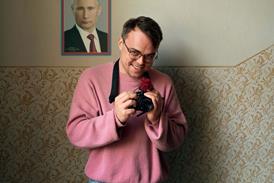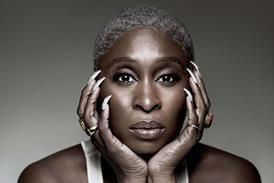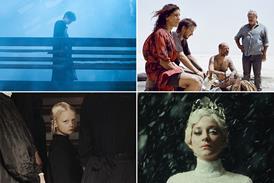Dir: Nick Broomfield. UK. 2001. 107mins.
The ostensible subject of Nick Broomfield's first feature since Kurt & Courtney, his controversial 1998 film about the suicide of Nirvana singer Kurt Cobain, is the unresolved murders of rap stars Tupac Shakur and Biggie Smalls. Its actual subject is much the same as that of all Broomfield's documentaries: the sweat, nerve and thick skin that go into making them. Fans and foes of the idiosyncratic director will find these qualities here in abundance, to either gratifying or irritating effect. Acclaimed at Sundance earlier this year, the film should thrive on the festival and urban niche circuits prior to a small screen career, while pending litigation by Smalls' mother against the Los Angeles Police Department guarantees its continuing topical interest. The film opens in home territory of the UK on May 24.
The audience is told at the beginning of Biggie N Tupac that its two protagonists were once close friends, but had become sworn enemies. Resentment and revenge seemed at first the respective motives for the murder, first of Shakur in September 1996, then of Smalls six months later. However Broomfield soon uncovers a morass of murky complicating factors.
These include gang warfare, the rivalry between the two artists' East and West Coast record labels and police corruption: involvement in drugs trafficking and protection racketeering was allegedly the reason for the LAPD's dilatory approach to investigating the murders. It's also suggested that the FBI was anxious to destabilise the rap movement as a potential focus of radical activity.
It's an enormously complex story, then, and no surprise that the film comes to no very firm conclusions. As usual in Broomfield's work, the director acts as the audience's guide through the maze, jamming his foot into unwelcoming doors and consorting with some very unsavoury customers, notably Marion "Suge" Knight, the head of Shakur's Los Angeles record label Death Row.
At the climax, the crew, denied an interview with Knight, then serving a long sentence for assault, decide to visit his maximum security prison anyway. With mixed results: the camera operator decline to go along "for reasons of self- preservation"; her replacement "had the ab-dabs" and delivered shakeycam images; and Knight himself gives a garbled pep talk to the kids on the streets laced with veiled accusations and threats against another rapper, Snoop Dogg. Broomfield treats the excursion as a display of macho bravado, loudly scorning his substitute cameraman for losing his nerve.
The film bears Broomfield's trademarks: a constant presence on camera and a flat and whining voice over narration. In one sequence, he takes a phone call from a key witness who refuses to collaborate because he's seen Broomfield's film on Hollywood madame Heidi Fleiss and thought it an ego trip to make the director look good and his interviewees foolish. Far from being dismayed, Broomfield can barely contain his delight that his notoriety has spread so far.
This film's main weakness is a sketchy sense of the relationship between its protagonists (although each man individually is deftly sketched in). It's best when focussing on the supporting characters, some eccentric, like Shakur's ex-bodyguard, a born-again Christian who keeps a pack of Rottweilers at his home in case divine protection fails him. Others are admirable, notably Biggie's mother, Miss Voletta Wallace, who, despite the rapper's cultivated ghetto image, turns out to be a dignified middle-class teacher who had a loving relationship to her late son.
Prod co: Lafayette Film for Channel Four
UK dist: Optimum Releasing
Int'l sales: Artists Independent Network
Prod: Michele D'Acosta
DoP: Joan Churchill, Mark Strasburg
Eds: Mark Atkins, Jaime Estrada-Torres
Music: Christian Henson

















No comments yet